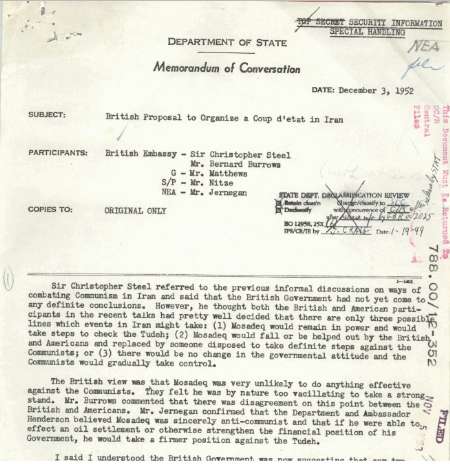
Financial Times' David J. Lynch in his article published in the paper has looked into how the United Kingdom dragged the United States into the coup, which was called 'Operation Ajax' by the Americans and 'Operation Boot' by the British.
The full text of the article reads as follow:
The British government in 1952 repeatedly asked the US to join in a coup aimed at toppling Mohammad Mosaddeq, Iran’s prime minister, according to newly declassified State Department documents.
The files offer “the first officially-released confirmation of Britain’s expressed aim in late 1952 to persuade Washington to help oust Mosaddeq,” according to two scholars affiliated with the National Security Archive, the private non-partisan research organization that obtained the documents.
The “Top Secret” State Department memoranda — including one entitled “British proposal to organize a coup d’état in Iran” — also offer fresh insights into London’s assessment of Iranian politics and the threat to British interests that eventually led to the August 1953 coup.
That anti-government uprising, backed by Britain and the US, toppled Mosaddeq, ushered in more than two decades of authoritarian rule by Shah Mohammad Reza Pahlavi and embittered relations between Tehran and the West.
In 1952, Winston Churchill’s British government was desperate to regain control of Iran’s oil industry, which Mosaddeq had nationalized the year before, “by virtually any available means, including military action,” write Malcolm Byrne of the National Security Archive and Tulane University’s Mark Gasiorowski.
Beginning in October, British and the US officials met at least three times to discuss prospects for toppling the Mosaddeq government. Sir Christopher Steel, the No 2 official in the British embassy in Washington, pitched the idea to reluctant US officials.
In recent years, the British government has repeatedly pressed US officials to shield from public view any official confirmation of London’s efforts to oust the Iranian government.
The documents made public on Tuesday were left out of a recent 1,007-page State Department volume released as part of its continuing “Foreign Relations of the United States” series. Mr. Byrne and Mr. Gasiorowski appealed against the government’s decision to keep the documents classified.
Before receiving an official reply, Mr. Gasiorowski discovered the records at a government archive in College Park, Maryland. A November 26, 1952 coup memo had been declassified on May 17, one month before the new State Department volume was published.
A related December 3, 1952 memo bore markings indicating that it would not be declassified until the British government approved, or 2025. The scholars complained that the British government was controlling what the US public could learn about its own government’s involvement.
It is not clear whether London was consulted about the release of the 1952 documents, they added.
The Truman administration had balked at Britain’s initial calls to act against Mosaddeq, who had expelled British diplomats and intelligence officials several months after nationalizing the oilfields.
By late 1952, the British had modified their sales pitch, stressing the need to take out Mosaddeq to combat “Communism in Iran,” the documents show. President Harry Truman and Dean Acheson, secretary of state, still refused to back a coup, preferring to work with Mosaddeq.
But Paul Nitze, who headed State’s powerful policy planning staff, suggested that the Iranian coup plotters first mount a “campaign” against Ayatollah Abolqasem Kashani, a leading opponent of British involvement in Iran’s oil industry, and the communist Tudeh Party.
British officials politely rejected that proposal and, while recognizing that the Truman administration was in its final weeks, pressed the US for a decision. “The best time for a coup would be in the spring,” Sir Christopher said, according to the December 3 memo, concluded the Financial Times article.
But needless to say, based on the evidence in the above article, once again Iran's argument is supported that Washington and London played an essential role in the coup.
Stephen Kinzer wrote in 'All the Shah's Men: An American Coup and the Roots of Middle East Terror' that the 1953 coup d'état was the first time the US used the American Central Intelligence Agency to overthrow a democratically elected, civil government.
According to Kinzer, the Eisenhower government considered Operation Ajax as a success, having 'immediate and far-reaching effect'; the CIA repeated the pattern the following year and organized a coup in Guatemala and toppled Jacobo Arbenz Guzmán, who had nationalized farm land.
In 2000, as part of an effort to mend relations with Iran, then-Secretary of State Madeleine Albright admitted that the US had 'played a significant role' in overthrowing Mosaddeq, saying 'The coup was clearly a setback for Iran's political development, and it is easy to see now why many Iranians continue to resent this intervention by America in their internal affairs.'
President Barack Obama made some remarks on June 4, 2009, in Cairo that makes it crystal clear that the US had a central role in the coup against the 'democratically-elected' government.
'This issue has been a source of tension between the United States and the Islamic Republic of Iran. For many years, Iran has defined itself in part by its opposition to my country, and there is indeed a tumultuous history between us. In the middle of the Cold War, the United States played a role in the overthrow of a democratically-elected Iranian government,' Obama said.
In the same speech, he also said, 'I have made it clear to Iran's leaders and people that my country is prepared to move forward. The question, now, is not what Iran is against, but rather what future it wants to build.' However his and his successor's actions later showed something else and actions speak louder than words.
9417**2044
Code:82626274 (6113549)
 solhkhabar | Peace International News Agency Peace International News Agency , Peace News , International Agency News of Peace
solhkhabar | Peace International News Agency Peace International News Agency , Peace News , International Agency News of Peace